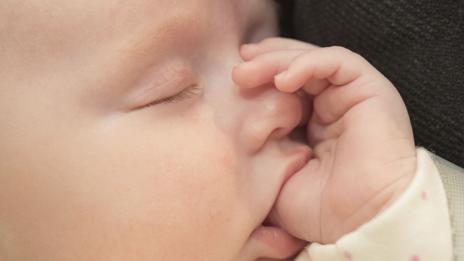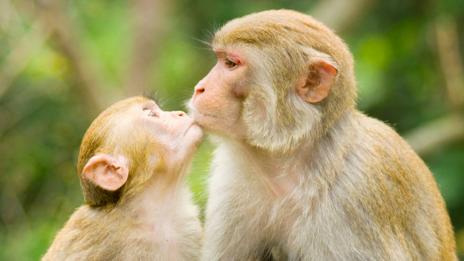
Human beings are unusual in that our mouths are surrounded by
hypersensitive, easily-hurt pink tissue – why?
They kind of flap around on the front of your face, get dried out and
chapped in the winter, and occasionally get caught up between your
teeth and mistaken for food. Seriously, what good are lips? Birds get on
just fine without them, turtles' lips have hardened into beaks as well,
and while most mammals have lips, we humans are in a class all our own
having lips that are permanently turned outwards.It turns out that lips are quite important; so important, even, that it seems worth the risk of having your bottom lip caught in between your chompers. Even though that can really hurt.
Using our lips to suck is one of the very first skills we have after we're born. In fact, it's so fundamental to our survival that it's known as a "primitive reflex"; we're born knowing how to suck and no learning is necessary. That's true for nearly all mammals.

Babies have an instinct to suck anything that brushes their lips (Thinkstock)
That means feeding, whether from breast or from bottle, is not a passive behaviour on the part of a newborn infant. It's more like a conversation, with each side doing his or her part in a dance elaborately choreographed by evolution. At the centre of that dance are the lips.
Read my lips
The lips are of course also important in the act of eating other foods, and in speech. In linguistics, the lips are two of many places of articulation, or spots in the mouth and throat that aid in blockage of air moving out from the lungs. Bring your two lips together and you can form the sounds p, b, and m. To make the sounds f or v, bring your lower lip to your upper teeth. To make a w sound, move the back of your tongue towards the roof of your mouth while also moving your lips closer together.Speech is arguably a critical part of human life, but it's not quite as much fun as kissing. Kissing isn't universal, though it does pop up in some 90% of cultures. Darwin himself noted that there are cultures in which kissing is conspicuously absent. "We Europeans are so accustomed to kissing as a mark of affection that it might be thought to be innate in mankind," he wrote in The Expression of Emotion in Man and Animals, "but this is not the case…[it is] unknown with the [Maori] New Zealanders, Tahitians, Papuans, Australians, Somals of Africa, and the Esquimaux [Eskimo]."

(Thinkstock)
In a 2008 issue of Scientific American Mind the writer Chip Walter argued, citing British zoologist Desmond Morris, that kissing may have originated from the primate behavior of pre-chewing food and passing it to the kids. Chimpanzee mothers, for example, are known to chew food and before swallowing they press their lips to the lips of their youngsters to allow the food to pass into their mouths. The pressing of lips may have then become a general means for relieving anxiety. Basic classical conditioning would suggest that by pairing lip stimulation with food, simply touching the lips would eventually trigger feelings of pleasure. Add to that the overabundance of nerve endings in the lips, and you have the recipe for ecstasy.
Lip service
Lips are exquisitely sensitive (if sometimes slimy) bits of tissue. The part of the brain responsible for detecting touch is called the somatosensory cortex, and is found on the top of the brain in an area called the postcentral gyrus. Touch sensations from all over the body get sent there to be processed, with each part of the body getting its own little sub-division along the postcentral gyrus, and the size reflects the density of receptors rather than the amount of skin available to touch. For example, the part devoted to sensations from the chest and stomach is fairly small. Meanwhile, the parts that process sensations from the hands and lips are enormous. Just as the hands are a central conduit with which we experience the world, so too are the lips.
(Thinkstock)
Gallup studied kissing behavior in a group who should know a thing or two about it: American college students. He and his colleagues found that one of the chief means through which college-aged women determined whether a partner was a good kisser was based upon chemical cues, taste and smell. And according to his research, college women said they were far less likely to have sex with a man unless they'd kissed him first. Whether humans indeed have pheromones, and whether we can even detect them if we do, kissing facilitates the sharing of body odours, which can relay a wealth of information regarding things like basic hygiene. In another survey conducted by Gallup, he asked "Have you ever found yourself attracted to someone, only to discover after kissing them for the first time that you were no longer interested?" Of the men he surveyed, 59% said yes, while 66% of the women agreed.
While his studies are quite obviously limited by focusing on American college students, when placed alongside the cross-cultural data and evidence from animal research, it seems reasonable to conclude that the close contact that kissing offers facilitates a good deal of sniffing. Whether we're aware of it or not, kissing may allow us to judge the potential suitability of those we desire.
And that’s why the occasional chapped lip, or mistaken bite of this hypersensitive part of the body, is all worth it.







0 comments:
Post a Comment